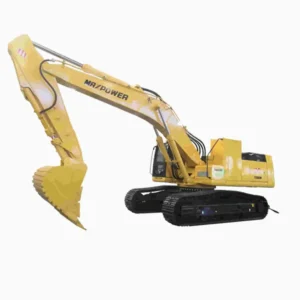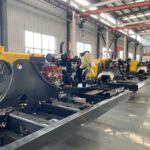Introduction
Mini excavator hammers, also known as hydraulic breakers or rock breakers, are powerful attachments used in construction and demolition projects. These compact yet robust tools provide an efficient method for breaking through tough surfaces, such as rocks, concrete, and asphalt. In recent years, there have been significant developments in mini excavator hammer technology, aimed at enhancing performance, durability, and operator comfort. This article explores the latest advancements in mini excavator hammer design and their impact on the construction industry.
Table of Contents
- Introduction
- Enhanced Power and Impact
- Improved Durability and Longevity
- Reduced Noise and Vibration
- Operator Comfort and Safety
- Environmental Considerations
- Integration of Smart Technologies
- Versatility and Adaptability
- Ease of Maintenance
- Cost-effectiveness
- Conclusion
- FAQs
Enhanced Power and Impact

One of the most significant developments in mini excavator hammer technology is the continuous enhancement of power and impact capabilities. Manufacturers have been relentlessly striving to increase the striking force of these attachments, enabling them to tackle even the most challenging materials with exceptional efficiency and effectiveness.
To achieve enhanced power and impact, various innovative techniques and advancements have been implemented. The hydraulic systems have undergone significant improvements, allowing for increased energy transfer and optimal force delivery. These advancements ensure that each blow from the mini excavator hammer is powerful enough to break through rocks, concrete, asphalt, and other tough surfaces encountered on construction sites.
Furthermore, the optimization of the energy transfer mechanisms has played a crucial role in maximizing the impact force. This ensures that the energy generated by the hydraulic system is efficiently transferred to the tool’s striking surface, resulting in powerful blows that rapidly break through the targeted material. The combination of advanced hydraulic systems and optimized energy transfer mechanisms has significantly increased the overall power and impact capabilities of mini excavator hammers.
Moreover, the latest advancements in hydraulic technology have allowed for better control and precision during operation. Operators can now adjust the hammer’s power and impact settings according to the specific requirements of each task. This level of control ensures that the mini excavator hammer delivers the optimal force needed to break through the material efficiently, while also preventing unnecessary damage to the surrounding structures or surfaces.
Additionally, manufacturers have focused on reducing the recoil effect, which is the backward movement generated by the force of the hammer blow. By minimizing recoil, operators can maintain better control and stability during operation, resulting in improved accuracy and reduced fatigue. This enhancement not only increases productivity but also enhances safety on the job site.
Improved Durability and Longevity
In order to withstand the demanding conditions of construction and demolition operations, mini excavator hammers have undergone significant improvements in terms of durability and longevity. Cutting-edge materials, such as high-strength alloys and reinforced steel, are being used to enhance the hammer’s resistance to wear and tear. Additionally, advanced heat treatment processes and improved sealing mechanisms contribute to prolonging the lifespan of these attachments, resulting in reduced maintenance costs for operators.
Reduced Noise and Vibration
In addition to enhancing power and impact, manufacturers have also made significant advancements in reducing noise and vibration levels generated by mini excavator hammers. Noise pollution and excessive vibration can have detrimental effects on both the operators and the surrounding environment. Therefore, minimizing these factors is a key focus in improving the overall working conditions and ensuring operator comfort and safety.
One of the key techniques employed to reduce noise and vibration is the integration of innovative damping technologies. These technologies effectively absorb and dissipate the energy generated during the hammering process, thereby minimizing the transmission of vibrations to the operator and the surrounding structures. By reducing vibrations, operators experience less fatigue and discomfort, enabling them to work for longer periods without compromising their well-being.
Moreover, advanced noise reduction technologies have been incorporated into the design of mini excavator hammers. These technologies consist of sound-absorbing materials and acoustic insulation, which help to minimize the noise generated during operation. By reducing noise levels, not only is the overall working environment improved, but the potential negative impact on nearby residents or other construction activities in the vicinity is also mitigated.
Furthermore, the advancements in hydraulic systems have contributed to the reduction of noise and vibration. Hydraulic systems with improved efficiency and precision result in smoother operation, thereby reducing unnecessary noise and vibration. The optimization of these systems ensures that the energy is transferred with minimal loss, minimizing the overall impact on the surrounding environment.
Operator Comfort and Safety
The comfort and safety of operators are of paramount importance in any construction activity. Manufacturers have responded to this by incorporating ergonomic features into mini excavator hammer designs. Adjustable handles, shock-absorbing systems, and improved weight distribution contribute to reducing operator fatigue and increasing overall safety during operation. Additionally, safety features such as overload protection systems and automatic shutdown mechanisms provide an extra layer of protection for both the operator and the equipment.
Environmental Considerations
As sustainability becomes an increasingly important focus in the construction industry, manufacturers of mini excavator hammers have made significant developments with regards to environmental considerations. Recognizing the need for more eco-friendly solutions, these advancements aim to minimize the impact of mini excavator hammers on the environment while maintaining their high performance and productivity.
One key area of improvement is the integration of energy-efficient hydraulic systems. These systems are designed to optimize power usage, reducing energy consumption and minimizing carbon emissions. By utilizing advanced hydraulic technology, mini excavator hammers can deliver powerful blows while operating with greater energy efficiency. This not only reduces the carbon footprint associated with their use but also leads to cost savings for operators through lower fuel consumption.
Furthermore, noise reduction technologies incorporated into mini excavator hammers have dual benefits. While they enhance operator comfort and reduce noise pollution, they also contribute to environmental conservation. The reduction of noise levels minimizes the disturbance to surrounding wildlife and ecosystems, particularly in sensitive areas where construction activities may overlap with protected habitats.
Additionally, the implementation of advanced filtration systems in mini excavator hammers helps to minimize air pollution. These filtration systems effectively capture and filter out dust particles and other pollutants generated during the operation of the hammers. By doing so, they prevent these harmful substances from being released into the air, promoting cleaner air quality on the job site and its surrounding areas.
Moreover, manufacturers have been exploring the use of sustainable materials in the construction of mini excavator hammers. The adoption of high-strength alloys and other eco-friendly materials not only enhances the durability and longevity of the hammers but also reduces the need for frequent replacements. This translates into lower waste generation and a more sustainable approach to equipment usage.
The integration of these environmental considerations into mini excavator hammer design demonstrates the commitment of manufacturers to sustainability and responsible construction practices. By prioritizing energy efficiency, noise reduction, air pollution control, and the use of sustainable materials, mini excavator hammers contribute to minimizing the environmental impact of construction projects.
Integration of Smart Technologies
The integration of smart technologies is transforming the way mini excavator hammers operate. Advanced control systems, proximity sensors, and real-time monitoring capabilities enable operators to optimize performance, diagnose issues, and track maintenance requirements. These smart features improve operational efficiency, minimize downtime, and enhance overall productivity on the job site.
Versatility and Adaptability
One of the key areas where significant advancements have been made in mini excavator hammer technology is in terms of versatility and adaptability. Manufacturers have focused on developing hammers that can be used in a wide range of applications and easily adapted to different job requirements, making them invaluable tools for various construction and demolition projects.
To enhance versatility, mini excavator hammers now feature quick-coupler systems. These systems allow for rapid attachment changes, enabling operators to switch between different tools and functionalities with ease. Whether it’s switching from a hammer to a compactor or a ripper, the quick-coupler system streamlines the process, saving valuable time and improving overall efficiency on the job site.
Furthermore, advancements in hammer design have resulted in improved maneuverability. Mini excavator hammers are now designed to be more compact and agile, enabling them to operate in tight spaces or confined areas. This increased maneuverability enhances precision and accuracy, allowing operators to navigate challenging terrain or work in close proximity to existing structures without compromising performance.
The adaptability of mini excavator hammers is also enhanced through the incorporation of adjustable settings and features. Operators can customize the power, impact force, and other parameters based on the specific requirements of each task. This adaptability ensures that the mini excavator hammer can be optimized for different materials, thicknesses, and working conditions, making it a versatile tool capable of handling a wide range of projects.
Ease of Maintenance
To reduce downtime and enhance productivity, manufacturers have focused on improving the maintenance aspects of mini excavator hammers. Accessible service points, simplified maintenance procedures, and remote diagnostic capabilities facilitate quick and efficient servicing. Additionally, enhanced durability and wear-resistant components minimize the need for frequent repairs, resulting in improved uptime and reduced overall maintenance costs.
Cost-effectiveness

Cost-effectiveness is a crucial aspect that has seen significant advancements in the realm of mini excavator hammers. Manufacturers have focused on improving the overall value proposition of these attachments by enhancing performance, reducing maintenance requirements, and increasing energy efficiency.
One of the key benefits of the latest developments in mini excavator hammers is their ability to deliver a higher return on investment. These advanced attachments offer improved productivity, allowing operators to accomplish tasks more efficiently and effectively. With increased productivity, projects can be completed in a shorter timeframe, leading to cost savings in terms of labor and equipment usage. The ability to break through tough materials quickly and effortlessly enhances project efficiency and contributes to overall cost-effectiveness.
Furthermore, advancements in mini excavator hammer technology have resulted in reduced maintenance requirements. Manufacturers have focused on designing hammers with accessible service points and simplified maintenance procedures, making it easier for operators to perform routine checks and maintenance tasks. Additionally, the integration of remote diagnostic capabilities enables timely identification of potential issues, minimizing downtime and reducing the need for extensive repairs. By reducing maintenance costs and increasing uptime, these advancements contribute to the overall cost-effectiveness of mini excavator hammers.
Energy efficiency is another significant aspect that has been addressed in recent developments. Manufacturers have optimized hydraulic systems and implemented energy-saving features, allowing mini excavator hammers to operate with reduced energy consumption. Lower energy consumption not only contributes to cost savings but also aligns with sustainability goals, reducing the environmental impact of construction activities.
Conclusion
In conclusion, the latest developments in mini excavator hammers have revolutionized the construction and demolition industry. Enhanced power and impact, improved durability and longevity, reduced noise and vibration, operator comfort and safety, environmental considerations, integration of smart technologies, versatility and adaptability, ease of maintenance, and cost-effectiveness are among the key areas of advancement. With these innovations, mini excavator hammers are empowering operators to accomplish tasks more efficiently, safely, and sustainably, thereby driving progress in the construction field.
FAQs
1. Are mini excavator hammers compatible with all excavator models?
Yes, mini excavator hammers are designed to be compatible with a wide range of excavator models, provided they meet the necessary specifications and requirements.
2. Can mini excavator hammers be used for underwater operations?
Yes, there are specialized mini excavator hammers available that are specifically designed for underwater operations, allowing for efficient underwater demolition and construction tasks.
3. What are the key maintenance practices for mini excavator hammers?
Regular inspection, lubrication, and cleaning of the hammer components are essential maintenance practices. It is also important to follow the manufacturer’s guidelines for servicing and to address any issues promptly.
4. Can mini excavator hammers be rented instead of purchased?
Yes, many equipment rental companies offer mini excavator hammers for short-term or long-term rental, providing flexibility and cost-effective options for construction projects.
5. What safety precautions should operators take when using mini excavator hammers? Operators should wear appropriate personal protective equipment (PPE), such as safety glasses, ear protection, and gloves. They should also receive proper training on operating the equipment and follow all safety guidelines outlined by the manufacturer.






-150x150.webp)
